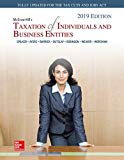
Loose Leaf for McGraw-Hill's Taxation of Individuals and Business Entities 2019 Edition
10th Edition
ISBN: 9781260189728
Author: Brian C. Spilker Professor, Benjamin C. Ayers, John Robinson Professor, Edmund Outslay Professor, Ronald G. Worsham Associate Professor, John A. Barrick Assistant Professor, Connie Weaver
Publisher: McGraw-Hill Education
expand_more
expand_more
format_list_bulleted
Question
Chapter 3, Problem 55P
To determine
Identify whether this would shift the income from Person B to Person J with reasons.
Expert Solution & Answer
Want to see the full answer?
Check out a sample textbook solution
Students have asked these similar questions
What are total assets of this financial accounting question?
Need help with this general accounting question
Calculate the gross profit ratio
Chapter 3 Solutions
Loose Leaf for McGraw-Hill's Taxation of Individuals and Business Entities 2019 Edition
Ch. 3 - 1. The goal of tax planning is to minimize taxes....Ch. 3 - Prob. 2DQCh. 3 - In this chapter we discussed three basic tax...Ch. 3 - What are the two basic timing strategies? What is...Ch. 3 - Prob. 5DQCh. 3 - What are some common examples of the timing...Ch. 3 - What factors increase the benefits of accelerating...Ch. 3 - How do changing tax rates affect the timing...Ch. 3 - Prob. 9DQCh. 3 - Prob. 10DQ
Ch. 3 - Prob. 11DQCh. 3 - What two factors increase the difference between...Ch. 3 - What factors have to be present for income...Ch. 3 - Prob. 14DQCh. 3 - Prob. 15DQCh. 3 - Prob. 16DQCh. 3 - Prob. 17DQCh. 3 - Prob. 18DQCh. 3 - Prob. 19DQCh. 3 - Explain how implicit taxes may limit the benefits...Ch. 3 - Prob. 21DQCh. 3 - Do after-tax rates of return for investments in...Ch. 3 - Prob. 23DQCh. 3 - Prob. 24DQCh. 3 - Prob. 25DQCh. 3 - What is an implicit tax and how does it affect a...Ch. 3 - Several judicial doctrines limit basic tax...Ch. 3 - What is the constructive receipt doctrine? What...Ch. 3 - Prob. 29DQCh. 3 - Relative to arms length transactions, why do...Ch. 3 - Prob. 31DQCh. 3 - Prob. 32DQCh. 3 - Prob. 33DQCh. 3 - Prob. 34DQCh. 3 - Yong recently paid his accountant 10,000 for...Ch. 3 - Billups, a physician and cash-method taxpayer, is...Ch. 3 - Prob. 37PCh. 3 - Prob. 38PCh. 3 - Prob. 39PCh. 3 - Prob. 40PCh. 3 - Prob. 41PCh. 3 - Prob. 42PCh. 3 - Prob. 43PCh. 3 - Prob. 44PCh. 3 - Prob. 45PCh. 3 - Prob. 46PCh. 3 - Prob. 47PCh. 3 - Prob. 48PCh. 3 - Prob. 49PCh. 3 - Prob. 50PCh. 3 - Prob. 51PCh. 3 - Prob. 52PCh. 3 - Prob. 53PCh. 3 - Prob. 54PCh. 3 - Prob. 55PCh. 3 - Prob. 56PCh. 3 - Prob. 57PCh. 3 - Prob. 58PCh. 3 - Prob. 59PCh. 3 - Prob. 60PCh. 3 - Prob. 61PCh. 3 - Prob. 62PCh. 3 - Prob. 63PCh. 3 - Prob. 64PCh. 3 - Prob. 65P
Knowledge Booster
Learn more about
Need a deep-dive on the concept behind this application? Look no further. Learn more about this topic, accounting and related others by exploring similar questions and additional content below.Similar questions
arrow_back_ios
SEE MORE QUESTIONS
arrow_forward_ios
Recommended textbooks for you
 Individual Income TaxesAccountingISBN:9780357109731Author:HoffmanPublisher:CENGAGE LEARNING - CONSIGNMENT
Individual Income TaxesAccountingISBN:9780357109731Author:HoffmanPublisher:CENGAGE LEARNING - CONSIGNMENT


Individual Income Taxes
Accounting
ISBN:9780357109731
Author:Hoffman
Publisher:CENGAGE LEARNING - CONSIGNMENT




How to (Legally) Never Pay Taxes Again; Author: Next Level Life;https://www.youtube.com/watch?v=q63F1pBrUHA;License: Standard Youtube License